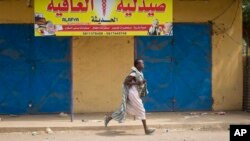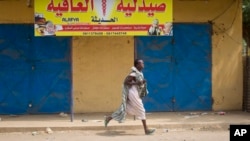South Sudan President Salva Kiir has accused the United Nations of seeking to take over the young country and speculated that the U.N. Mission in South Sudan (UNMISS) may have pushed his political rival, former Vice President Riek Machar, to rise up against the government.
"We did not know, when the UNMISS was brought to South Sudan, they were brought as a parallel government to the government of South Sudan," Kiir told reporters in Juba late Monday.
"But they showed very clearly in this conflict that UNMISS was brought here to be the government of the south and they fell short of naming the chief of the UNMISS as co-president of South Sudan," he said, referring to UNMISS head, Hilde Johnson.
Kiir was speaking a day after South Sudan Information Minister Michael Makuei Lueth was barred access to the U.N. compound in Bor, where some 10,000 people have sought refuge, and hours after at least 32 civilians and two U.N. contractors were wounded by gunfire at the U.N. base in Malakal as fighting between government and opposition forces raged nearby.
UNMISS officials said they refused access to Makuei because his bodyguards were armed, and the U.N. has a strict "no weapons" policy on its facilities. Makuei's bodyguards reportedly threatened U.N. staff before withdrawing.
More than 70,000 civilians have sought shelter on eight U.N. bases in South Sudan since clashes erupted in mid-December between pro- and anti-government forces. Around 22,000 civilians are sheltering at the U.N. base in Malakal, the capital of oil-producing Upper Nile state.
In a statement released Monday, UNMISS condemned the "fighting taking place nearby its bases" and echoed a call made by U.N. Secretary-General Ban Ki-moon for all parties in the conflict "to respect the integrity of U.N. installations" and the security of civilians and U.N. personnel.
But in his statement to reporters, Kiir accused Ban of wanting to take over South Sudan by installing UNMISS as a parallel government.
"If that is the position of Ban Ki-moon, he should make it clear that he wants the U.N. to take over South Sudan so that nobody bothers around any other person," Kiir said.
"And if they were the ones who were instigating Riek Machar to take this action, they really ill-advised him," Kiir said.
The U.N. reacted to Kiir's statement with a call for leaders on both sides of the South Sudan conflict to not make statements that could exacerbate tensions in the country.
Comments against the U.N. mission from senior government and anti-government figures "risk enflaming the situation and being taken by others as incitement to violence against civilians and U.N. personnel," U.N. spokesman Farhan Haq said.
"It's time for careful, measured public statements, aimed at calming, not enflaming the situation," he said.
The U.N. Office for the Coordination of Humanitarian Affairs (OCHA) said in its most recent report that 494,000 people are internally displaced in South Sudan and 86,100 have fled to neighboring countries.
UNMISS, which the Security Council has ordered reinforced by another 5,500 troops, bringing its total to nearly 14,000, said it has conducted more than 140 patrols in the past 24 hours, including in various locations in the capital, Juba, and in the three states most affected by the ongoing fighting -- Jonglei, Unity, and Upper Nile.
No precise death toll has been established for the more than five weeks of fighting in South Sudan, but a top U.N. official said this week after a visit to the country that "many thousands" were likely to have been killed. Among the dead are two U.N. peacekeepers who were killed in an attack last month on a U.N. base in Akobo, Jonglei state.
The same official, Assistant Secretary-General for Human Rights Ivan Simonovic, on Monday said both sides in the conflict are suspected of involvement in human rights violations, some of which may be war crimes.
"We did not know, when the UNMISS was brought to South Sudan, they were brought as a parallel government to the government of South Sudan," Kiir told reporters in Juba late Monday.
We did not know, when the UNMISS was brought to South Sudan, they were brought as a parallel government to the government of South Sudan.South Sudan President Salva Kiir
Kiir was speaking a day after South Sudan Information Minister Michael Makuei Lueth was barred access to the U.N. compound in Bor, where some 10,000 people have sought refuge, and hours after at least 32 civilians and two U.N. contractors were wounded by gunfire at the U.N. base in Malakal as fighting between government and opposition forces raged nearby.
UNMISS officials said they refused access to Makuei because his bodyguards were armed, and the U.N. has a strict "no weapons" policy on its facilities. Makuei's bodyguards reportedly threatened U.N. staff before withdrawing.
More than 70,000 civilians have sought shelter on eight U.N. bases in South Sudan since clashes erupted in mid-December between pro- and anti-government forces. Around 22,000 civilians are sheltering at the U.N. base in Malakal, the capital of oil-producing Upper Nile state.
In a statement released Monday, UNMISS condemned the "fighting taking place nearby its bases" and echoed a call made by U.N. Secretary-General Ban Ki-moon for all parties in the conflict "to respect the integrity of U.N. installations" and the security of civilians and U.N. personnel.
But in his statement to reporters, Kiir accused Ban of wanting to take over South Sudan by installing UNMISS as a parallel government.
"If that is the position of Ban Ki-moon, he should make it clear that he wants the U.N. to take over South Sudan so that nobody bothers around any other person," Kiir said.
"And if they were the ones who were instigating Riek Machar to take this action, they really ill-advised him," Kiir said.
The U.N. reacted to Kiir's statement with a call for leaders on both sides of the South Sudan conflict to not make statements that could exacerbate tensions in the country.
Comments against the U.N. mission from senior government and anti-government figures "risk enflaming the situation and being taken by others as incitement to violence against civilians and U.N. personnel," U.N. spokesman Farhan Haq said.
"It's time for careful, measured public statements, aimed at calming, not enflaming the situation," he said.
The U.N. Office for the Coordination of Humanitarian Affairs (OCHA) said in its most recent report that 494,000 people are internally displaced in South Sudan and 86,100 have fled to neighboring countries.
UNMISS, which the Security Council has ordered reinforced by another 5,500 troops, bringing its total to nearly 14,000, said it has conducted more than 140 patrols in the past 24 hours, including in various locations in the capital, Juba, and in the three states most affected by the ongoing fighting -- Jonglei, Unity, and Upper Nile.
No precise death toll has been established for the more than five weeks of fighting in South Sudan, but a top U.N. official said this week after a visit to the country that "many thousands" were likely to have been killed. Among the dead are two U.N. peacekeepers who were killed in an attack last month on a U.N. base in Akobo, Jonglei state.
The same official, Assistant Secretary-General for Human Rights Ivan Simonovic, on Monday said both sides in the conflict are suspected of involvement in human rights violations, some of which may be war crimes.





